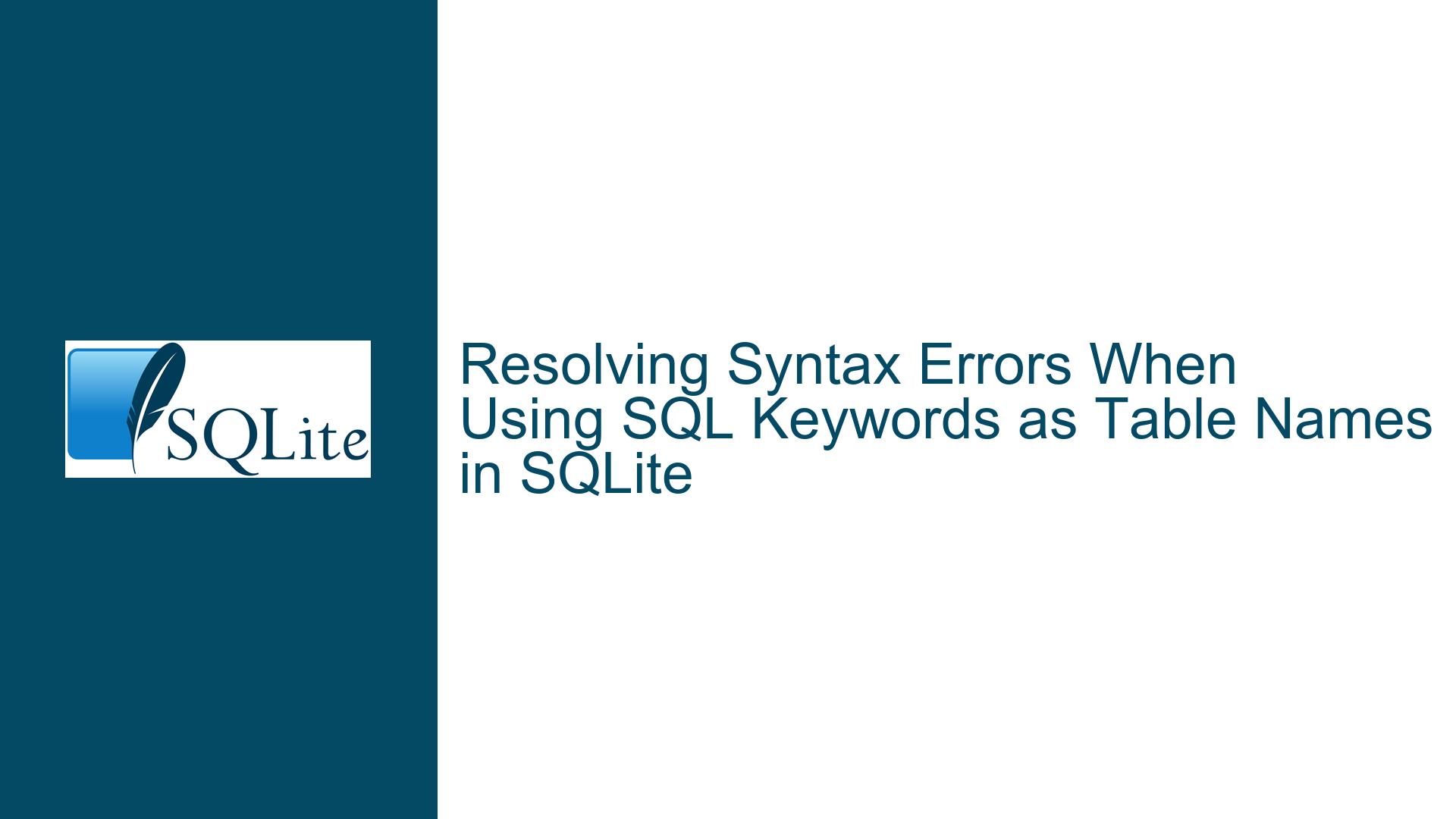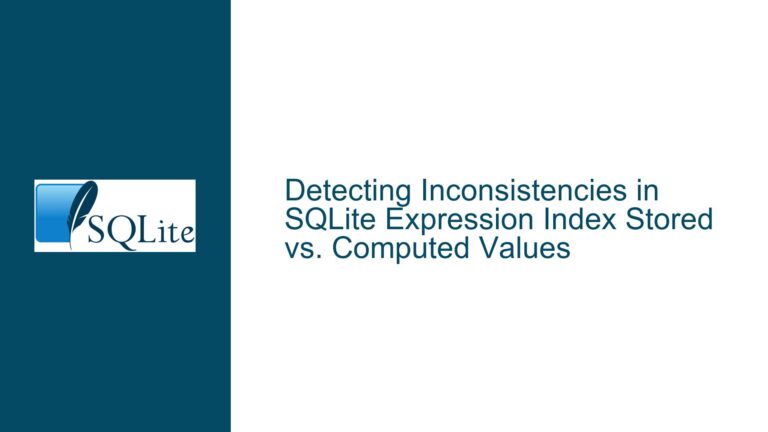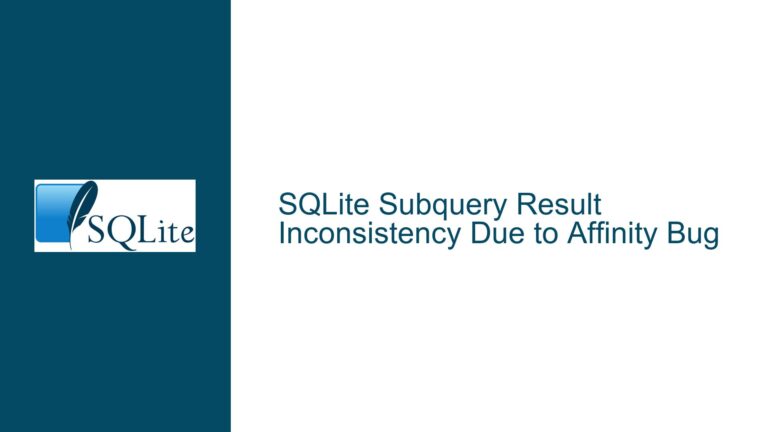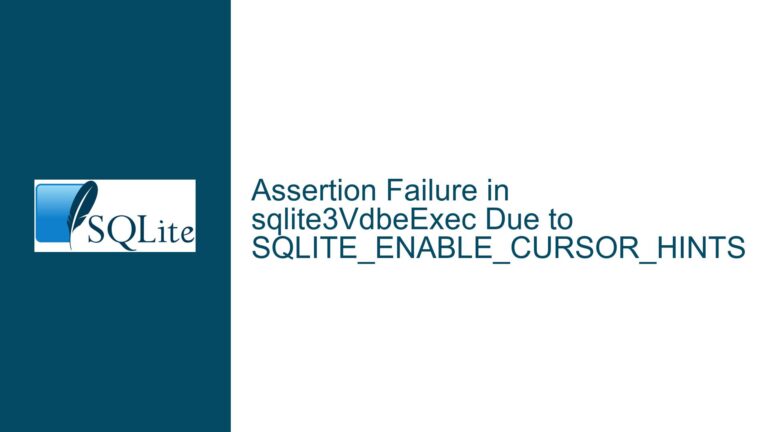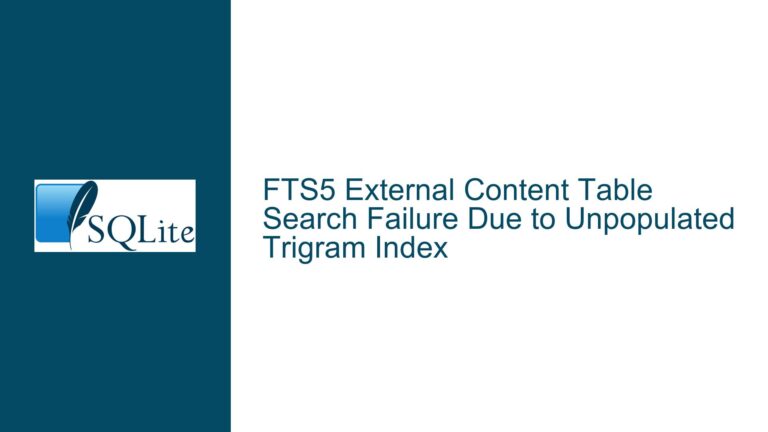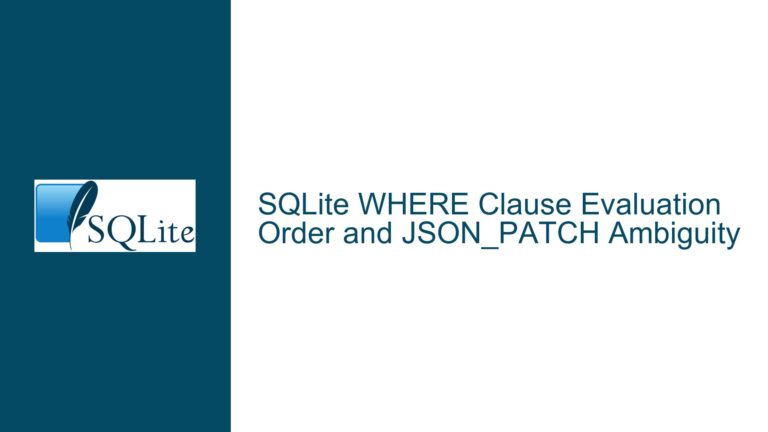Resolving Syntax Errors When Using SQL Keywords as Table Names in SQLite
Understanding the Conflict Between SQL Keywords and Table Names
When working with SQLite, one of the most common issues that developers encounter is the conflict between SQL keywords and user-defined identifiers, such as table names. SQLite, like many other SQL databases, reserves certain words for its syntax, known as keywords. These keywords are used to construct SQL statements, such as SELECT, FROM, WHERE, and ORDER BY. However, when a user attempts to use one of these reserved keywords as a table name or column name, it can lead to syntax errors or unexpected behavior.
The core of the issue lies in how the SQLite parser interprets the SQL statements. The parser is designed to recognize keywords and use them to understand the structure of the query. When a keyword is used as an identifier (such as a table name), the parser may misinterpret the query, leading to errors. For example, if you name a table order, the parser might confuse it with the ORDER BY clause, resulting in a syntax error when you try to query the table.
This issue is not unique to SQLite; it is a common challenge across many SQL databases. However, SQLite provides a straightforward solution: the use of double-quotes to explicitly indicate that a word is an identifier rather than a keyword. By wrapping the table name in double-quotes, you can avoid ambiguity and ensure that the parser correctly interprets your query.
The Role of Double-Quotes in Disambiguating Keywords and Identifiers
Double-quotes play a crucial role in SQLite by allowing developers to use reserved keywords as identifiers without causing parsing errors. When you enclose a table name or column name in double-quotes, you are telling the SQLite parser to treat that word as an identifier, regardless of whether it is a reserved keyword. This mechanism provides a way to avoid conflicts between SQL syntax and user-defined names.
For example, consider the table name order. Without double-quotes, the parser might interpret order as part of an ORDER BY clause, leading to a syntax error. However, by writing SELECT * FROM "order";, you explicitly inform the parser that order is a table name, not a keyword. This ensures that the query is executed correctly.
It is important to note that while double-quotes are the standard way to escape identifiers in SQLite, some tools and libraries may handle this automatically. For instance, DB Browser for SQLite might automatically quote identifiers when generating SQL statements. However, relying on such tools can sometimes lead to confusion, especially when switching between different environments or tools. Therefore, it is generally a good practice to manually quote identifiers when using reserved keywords as table or column names.
Best Practices for Naming Tables and Columns to Avoid Keyword Conflicts
While using double-quotes can resolve conflicts between SQL keywords and identifiers, the best practice is to avoid using reserved keywords as table or column names altogether. This approach not only prevents potential parsing issues but also improves the readability and maintainability of your SQL code.
When naming tables and columns, consider the following guidelines:
Avoid Reserved Keywords: Familiarize yourself with the list of SQLite reserved keywords and avoid using them as identifiers. This list includes common words like
SELECT,FROM,WHERE,ORDER,GROUP, andJOIN.Use Descriptive Names: Choose names that clearly describe the data they represent. For example, instead of naming a table
order, you could usecustomer_ordersorpurchase_orders. This not only avoids keyword conflicts but also makes your schema more intuitive.Use Underscores or CamelCase: When naming tables and columns, use underscores (
_) or CamelCase to separate words. This improves readability and reduces the likelihood of accidentally using a reserved keyword. For example,customer_ordersorcustomerOrdersare better choices thancustomerorders.Consistent Naming Conventions: Establish and follow consistent naming conventions across your database schema. This makes it easier to understand the structure of your database and reduces the risk of naming conflicts.
Prefixing: In some cases, prefixing table names with a short identifier related to the application or module can help avoid conflicts. For example, if you are working on an e-commerce application, you could prefix all table names with
ec_, such asec_orders,ec_customers, andec_products.
By following these best practices, you can minimize the risk of encountering syntax errors due to keyword conflicts and create a more robust and maintainable database schema.
Troubleshooting Syntax Errors Related to Keyword Conflicts
When you encounter a syntax error in SQLite that you suspect is related to a keyword conflict, follow these steps to diagnose and resolve the issue:
Identify the Problematic Query: Start by isolating the query that is causing the error. Look for any table or column names that might be reserved keywords.
Check the SQLite Reserved Keywords List: Refer to the official SQLite documentation to verify whether the table or column name in question is a reserved keyword. If it is, you will need to quote the identifier.
Quote the Identifier: Wrap the problematic table or column name in double-quotes. For example, if you have a table named
order, change your query fromSELECT * FROM order;toSELECT * FROM "order";.Test the Query: Execute the modified query to ensure that the syntax error is resolved. If the error persists, double-check the query for any other potential issues.
Review Your Schema: If you frequently encounter keyword conflicts, consider reviewing your database schema to identify any tables or columns that use reserved keywords. Rename these identifiers to avoid future issues.
Use Tools to Automate Quoting: Some SQLite tools and libraries automatically quote identifiers for you. If you are using such a tool, ensure that it is configured correctly and that it handles keyword conflicts appropriately.
Consult the Documentation: If you are unsure whether a particular word is a reserved keyword or how to properly quote identifiers, consult the SQLite documentation or seek advice from the SQLite community.
By systematically following these steps, you can quickly identify and resolve syntax errors related to keyword conflicts in SQLite.
Advanced Considerations: Aliases and Complex Queries
In more complex SQL queries, the use of aliases can introduce additional challenges when dealing with keyword conflicts. An alias is a temporary name assigned to a table or column within a query, often used to simplify the query or to resolve naming conflicts. However, if an alias is a reserved keyword, it can lead to the same parsing issues as using a keyword as a table or column name.
For example, consider the following query:
SELECT o.foo FROM "order" AS o ORDER BY o.bar;
In this query, o is an alias for the order table. While o is not a reserved keyword, if you were to use a reserved keyword as an alias, you would need to quote it. For instance:
SELECT "order".foo FROM "order" AS "order" ORDER BY "order".bar;
In this case, the alias order is a reserved keyword, so it must be quoted to avoid a syntax error. While this approach works, it can make the query more difficult to read and maintain. Therefore, it is generally advisable to avoid using reserved keywords as aliases.
When working with complex queries, consider the following tips:
Use Meaningful Aliases: Choose aliases that are descriptive and do not conflict with reserved keywords. For example, instead of using
orderas an alias, useordoro.Consistent Aliasing: Establish a consistent aliasing convention across your queries. This makes it easier to understand and maintain your SQL code.
Avoid Overloading Aliases: Be cautious when using the same alias for multiple tables or columns within a query. This can lead to confusion and potential conflicts.
Test Complex Queries: When writing complex queries, test them incrementally to ensure that they are free of syntax errors and that aliases are correctly interpreted by the parser.
By carefully managing aliases and avoiding reserved keywords, you can write more robust and maintainable SQL queries in SQLite.
Conclusion: Navigating Keyword Conflicts in SQLite
Navigating the complexities of SQLite’s reserved keywords and their potential conflicts with user-defined identifiers is a critical skill for any database developer. By understanding the role of double-quotes in disambiguating keywords and identifiers, adopting best practices for naming tables and columns, and systematically troubleshooting syntax errors, you can avoid common pitfalls and ensure the smooth operation of your SQLite databases.
Remember that while SQLite provides mechanisms to handle keyword conflicts, the best approach is to proactively avoid using reserved keywords as identifiers. This not only prevents parsing issues but also enhances the readability and maintainability of your SQL code. By following the guidelines and troubleshooting steps outlined in this post, you can confidently manage your SQLite databases and resolve any issues related to keyword conflicts.
